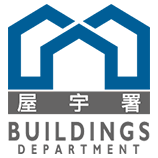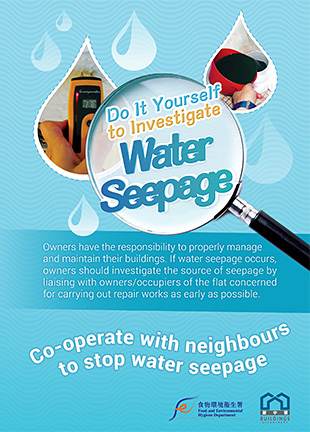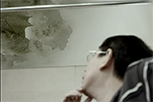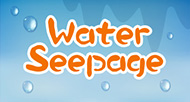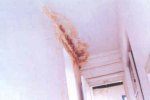
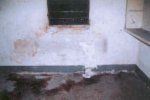
Common causes of water seepage:
- Leakage in the drainage pipes of the upper, adjacent or your own flat.
- Leakage in the water supply pipes of the upper, adjacent or your own flat.
- Defective or deteriorated waterproofing of floor slabs or bath-tub sealants.
- Seepage of rain water through roof / podium / balcony / external wall / window of buildings.
In most cases, water seepage is caused by leakage from defective water pipes, sanitary fitments or drainage pipes. Usually, these defects can be rectified by simple repair works. Owners should directly engage a building technician or licensed plumber to identify the cause of seepage for prompt repairs. Please also refer to the investigation methods in the "Do It Yourself to Investigate Water Seepage" pamphlet as published by the Joint Office of the Food and Environmental Hygiene Department and the Buildings Department (the Joint Office).
Owners have the responsibility for maintaining and managing their building, which include resolving any seepage problem. You should quickly approach your neighbour for investigation and repair work to resolve the problem if the seepage is suspected to originate from the flat on the upper floor or next door. Besides, assistance may be sought from the property management company or the Owners' Corporation of your building. Where necessary, you should with the engagement of a building professional or legal consultant request the responsible person to stop the seepage in accordance with the provisions under the Deed of Mutual Covenant, or even lodge a claim for damages.
If you cannot resolve the problem of water seepage with your neighbour, please call "1823" for assistance. Upon receipt of the seepage complaint, the Joint Office will carry out a preliminary investigation. If the seepage has posed a sanitary nuisance, the Joint Office will act in accordance with the relevant provisions of the Public Health and Municipal Services Ordinance (Cap. 132). If the seepage is mild or intermittent or if the source of seepage cannot be identified after investigation, Government intervention will cease.
The Joint Office will invoke statutory powers bestowed upon it by relevant legislation to investigate if a seepage case contravenes the legal requirements. If there is no concrete evidence to prove that the case violates relevant legal requirements, Joint Office will have no legal basis to take enforcement action.
The owners/occupants could also refer to the "Notes to Owners/Occupants on the general procedures for investigating water seepage" prepared by the Joint Office, as follows:
The Joint Office aims to provide a "one-stop" service in dealing with reports of water seepage in buildings. Its role is to enforce the relevant provisions of the Public Health and Municipal Services Ordinance (Cap. 132) in abating any nuisance caused by water seepage. If necessary, the Joint Office will refer cases to the Buildings Department (BD) or the Water Supplies Department (WSD) for follow up action. For example, the BD will tackle the problem of building dilapidations and defective drains under the Buildings Ordinance (Cap. 123), while WSD will check if there is any wastage of water under the Waterworks Ordinance (Cap. 102).
According to the investigation procedure, the Joint Office will contact the informant within six working days upon receipt of a report. The staff will first inspect the premises and then enter the flat under report to carry out non-destructive tests systematically attempting to identify the seepage source. For simple and straightforward cases with the co-operation of the concerned owners/occupiers, the Joint Office normally will complete the investigation including testing and inform the informant of the outcome within 90 working days. If the investigation cannot be completed within 90 working days, the Joint Office will notify the informant of the investigation progress in writing.
The Joint Office has been authorised to enforce the relevant provisions of the Public Health and Municipal Services Ordinance (Cap. 132). Where the source of seepage posing a health nuisance is identified, the person concerned will be issued with a "Nuisance Notice" requiring the abatement of nuisance within a specified period of time, failing which the person will be subject to prosecution. The Joint Office may also apply to the Court for a "Nuisance Order" requiring the person concerned to abate the nuisance. Failure to comply with the order will result in prosecution. The Public Health and Municipal Services (Amendment) Ordinance 2025 (the Amendment Ordinance) comes into operation on 17 August 2025, the maximum penalty for non-compliance of a "Nuisance Notice" is increased to HK$25,000 and daily fine HK$450 and that for non-compliance of a "Nuisance order" is increased to HK$50,000 and daily fine HK$600.
When handling a seepage complaint, the cooperation of all parties concerned is essential to allow the investigation officer access for testing and collecting evidence inside both the complainant's flat as well as the other flat suspected to be causing seepage in order to identify the seepage source. Depending on the circumstances, it may be necessary to conduct several tests and collect different samples for examination. If the owner/occupant concerned refuses to co-operate, the investigation process may be extended as the Joint Office will have to apply to the Court for a warrant to enter the flat in question.
The Amendment Ordinance, which comes into operation on 17 August 2025, stipulates that any person who fails to comply with a "Notice of Intended Entry" without reasonable excuse is an offence and may be liable to a maximum fine HK$5,000. Additionally, it extends the permissible hours for entering the premises concerned to investigate nuisances to between 7 a.m. and 10 p.m.
If owners wish to obtain duplicates of the concerned investigation reports for water seepage, request may be made under the Code on Access to Information. The applicant should submit an application form to the Joint Office through mail, facsimile or e-mail. The application form can be downloaded from BD's website at https://www.access.gov.hk/filemanager/content/howtomakeinfo/ati.pdf, or obtained from the Joint Office, as detailed below:
| Address | Office Hours | E-mail / Fax | |
|---|---|---|---|
| Hong Kong Regional Joint Office (Eastern, Wanchai, Central & Western, Southern, Islands) |
9/F, The Hub, 23 Yip Kan Street, Wong Chuk Hang, Hong Kong. |
Monday to Friday: 8:45 a.m. to 1:00 p.m. 2:00 p.m. to 6:00 p.m. Saturday, Sunday and Public Holiday: Closed |
hkrjo@fehd.gov.hk/ 2180 6758 |
| Kowloon Regional Joint Office (Kowloon City, Sham Shui Po, Mong Kok, Yau Tsim, Wong Tai Sin, Kwun Tong) |
Suite 7B-10A, 21/F, Skyline Tower, No. 39 Wang Kwong Road, Kowloon Bay, Kowloon |
Monday to Friday: 8:45 a.m. to 1:00 p.m. 2:00 p.m. to 6:00 p.m. Saturday, Sunday and Public Holiday: Closed |
krjo@fehd.gov.hk/ 3156 2099 |
| New Territories West Regional Joint Office (Kwai Tsing, Tsuen Wan, Tuen Mun, Yuen Long) |
26/F, The Octagon, 6 Sha Tsui Road, Tsuen Wan, New Territories |
Monday to Friday: 8:45 a.m. to 1:00 p.m. 2:00 p.m. to 6:00 p.m. Saturday, Sunday and Public Holiday: Closed |
ntwrjo@fehd.gov.hk/ 3150 8368 |
| New Territories East Regional Joint Office (Tai Po, Sha Tin, Sai Kung, North) |
Unit 2101-2103 & 2111-2121, 21/F, Tower 2, Grand Central Plaza, 138 Sha Tin Rural Committee Road, Sha Tin, N.T. |
Monday to Friday: 8:45 a.m. to 1:00 p.m. 2:00 p.m. to 6:00 p.m. Saturday, Sunday and Public Holiday: Closed |
nterjo@fehd.gov.hk/ 3426 3411 |
As the information requested is not publications which are available free of charge, the following duplicating fees will be levied:
For copying Stage I and II investigation reports, the duplicating fees are listed on the Food and Environmental Hygiene Department's webpage below:
https://www.fehd.gov.hk/english/department/code_on_access_info_proce.html
For copying Stage III investigation reports, the duplicating fees are as follows:
| Prescribed fee (HK$) # | ||
|---|---|---|
| Report duplicate | Handling fee * | Duplicating fee |
| Black and white duplicate | $5.1 per sheet | $1.5 per sheet |
| Colour duplicate | $5.1 per sheet | $3.3 per sheet |
Water seepage is usually caused by defective building fabric or installations and the lack of proper building maintenance. As it is the responsibility of the owners / occupiers to maintain their buildings and to ensure environmental hygiene, their co-operation in resolving water seepage problems is essential. While the Joint Office would assist in identifying the source of seepage, the owners /occupiers can cooperate to engage building professionals or consultant firms for carrying out the investigation, identifying the source of seepage, and conducting necessary repair works to resolve the water seepage problems. The building related institutes and organizations have experienced building professionals / consultant firms providing related services to the general public. Among the building related institutes, The Hong Kong Institute of Surveyors (HKIS) proactively informs that their experienced professional members / building surveying consultant firms are willing to provide such services. The following hyperlinks are provided by the HKIS.
- List of Consultancy Firms provide Advice on Water Seepage Problem
https://www.hkis.org.hk/hkis/general/bsd/companylist/2023/BS%20Company%20List202309_11.pdf - List of Experts on Water Seepage Investigation
https://www.hkis.org.hk/en/experts.html?category=1
Owners are responsible for making their own assessment of all information in the Lists. The HKIS should be contacted should there be any queries on any matters regarding the Lists. The Lists are compiled, maintained and provided by the HKIS. The Government of the HKSAR plays no part in the compilation of the Lists and shall not be responsible for any inaccuracies in the Lists nor any errors/incomplete information arising from the hyperlinks nor any loss or damage whatsoever arising out of or in connection with any information or the performance of the service providers in the Lists. The service providers in the Lists should not be regarded as endorsed or recommended by the BD or the Government of the HKSAR nor imply that the Government of the HKSAR promotes their expertise or their business.
If water seepage problems involve the water supply system, owners may appoint a licensed plumber under the Waterworks Regulations (Cap. 102A) for checking the system and carrying out the necessary repair works. The Licensed Plumber Directory is available on the following webpage of the Water Supplies Department (WSD):
http://www.wsd.gov.hk/en/plumbing-engineering/licensed-plumbers/index.html
The WSD will not intervene in a private dispute arising from a mild water seepage nuisance where there is no evidence of waste of water. In that case, you can consider approaching the Hong Kong International Arbitration Centre (Tel: 2525 2381) to assist in conciliation. If necessary, you can also seek legal advice from your lawyer to see whether civil proceedings should be instituted.
Under normal circumstances, seepage originated from penetration of rainwater through roofs, flat roofs, balconies, external walls or windows of a building or from leaking water pipes will not cause any public health implications and is not nuisance actionable by the Joint Office under the Public Health and Municipal Services Ordinance (Cap. 132). The Joint Office will not follow up such seepage report in accordance with the established procedure. Having said that, the Joint office will advise the Owners' Corporation to arrange building professionals to inspect the conditions of the external walls / roofs of the building and registered contractors to carry out necessary repair works. If necessary, the Joint Office will refer the case to the BD for follow-up action on building safety problem.
Water seepage investigation will generally be conducted in three stages. Staff of the Joint Office will visit the premises concerned to carry out Stage I and II investigations. If the source of water seepage could not be identified, the Joint Office will in the Stage III investigation arrange for an outsourced consultant to visit the premises concerned to carry out investigation and tests. The Joint Office will issue a letter to inform the occupants of the premises concerned in advance of such an arrangement and provide the names and contact telephone numbers of the staff of the Joint Office and the consultant responsible for the case and a sample of the consultant's staff card. The consultant's staff visiting the premises concerned should bring along their staff cards for identification and verification by the public. The staff cards are issued by the Joint Office and the contact telephone numbers of the Joint Office and the consultant are shown on the staff card to enable the public to make enquiries.
The names and contact numbers of the outsourced consultants employed by the Joint Office for carrying out water seepage investigation are listed as follows:
If you have any doubt regarding the authenticity of the Joint Office's letters or the identity of the consultant's staff, you can contact the Joint Office at 3691 8479 (Hong Kong), 3156 1942 (Kowloon), 3426 3346 (New Territories East) and 3150 8370 (New Territories West).
In order to streamline the Joint Office’s procedures at various stages of investigation and speed up the handling of water seepage problems in buildings, upon completion of Stage I investigation, Stage II Initial Investigation and Stage III Professional Investigation originally to be carried out sequentially will be carried out concurrently to expedite the water seepage investigation.
The Food and Environmental Hygiene Department is responsible for carrying out Stage II Initial Investigation. Normally, staff from the Joint Office will visit the premises concerned for investigation and tests, which include moisture content monitoring at the affected premises and colour water tests at the drainage outlets of the premises suspected to be causing water seepage.
The consultants appointed by the Joint Office are responsible for carrying out Stage III Professional Investigation. Depending on the circumstances and needs of the case, one or several tests will be conducted by the staff of the consultants. If the site circumstances are considered suitable, microwave moisture sensing devices may be used to measure the referenced moisture content data of the sub-layers of the concrete floor slab for analysing the source of water seepage. However, this method has limitations, and microwave tomography cannot be effectively applied under certain circumstances, such as spalling of concrete ceilings affected by water seepage, blockage of drainage pipes or other facilities, tile finishes on ceilings or false ceilings, etc. In these cases, conventional testing methods such as ponding test and spray test will be applied by the staff of the consultants.
For simple and straightforward cases with the co-operation from the owners / occupants concerned, the Joint Office preliminarily proposes to shorten the investigation time from 90 working days to 64 working days (i.e. by 26 working days). The actual time required for processing each reported water seepage case may differ, largely depending on the complexity of the case and the extent of co-operation from the parties concerned, in particular the owners and occupants involved. For complicated cases which may, for instance, involve multiple sources of water seepage, subdivided unit households, recurring or intermittent water seepage, investigators will have to conduct different or repeated tests, or ongoing investigations and monitoring in order to ascertain the cause of water seepage, which may prolong the time for investigation.
Since mid-September 2023, the Joint Office has carried out Stage II and Stage III investigations concurrently in four districts (namely Wong Tai Sin, North District, Yuen Long and Islands District) on a trial basis. Starting from late December 2024, Tai Po and Kwai Tsing districts will be included in the trial, expanding the trial to cover six districts for carrying out the two stages of investigations concurrently.
As full implementation requires substantial additional resources from the Joint Office and the consultants, a trial is first implemented by the Joint Office in six districts (namely Wong Tai Sin, North District, Tai Po, Kwai Tsing, Yuen Long and Islands District) in phases. The Joint Office will continue to examine the effectiveness of the new work mode after implementation in the trial districts, and optimise the related workflow and technical guidelines. Moreover, it will also discuss with the consultants such matters as contractual arrangements and manpower deployment, and assess the capacity of service providers in the market. After the assessment, it will consider the feasibility of extending the new work mode to more districts.
Carrying out Stage II and Stage III investigations concurrently does not involve any change in the techniques used in water seepage investigations. Therefore, it will not have an impact on the percentage of cases identified with the source of water seepage during the investigations.
